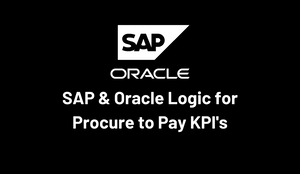General
There are several key performance indicators (KPIs) that can be used to measure the effectiveness and efficiency of a procure-to-pay (P2P) process. Here are some of the most important ones:
- Purchase Order Cycle Time: This KPI measures the time it takes from the initiation of a purchase order to its approval. It's a good indicator of how quickly the procurement process is being completed.
- Invoice Processing Time: This KPI measures the time it takes to process an invoice from receipt to payment. A shorter processing time is indicative of an efficient process.
- First-Time Match Rate: This KPI measures the percentage of invoices that are matched to the corresponding purchase order and goods receipt on the first attempt. A high first-time match rate indicates the accuracy of the procurement process.
- Purchase Order Accuracy: This KPI measures the percentage of purchase orders that are issued without errors. A high level of accuracy indicates that the procurement process is efficient and that suppliers are receiving accurate purchase orders.
- Cost per Invoice: This KPI measures the total cost of processing an invoice, including labor, materials, and overhead. A lower cost per invoice is indicative of an efficient process.
- Contract Compliance: This KPI measures the percentage of orders that comply with the terms of the contract. A high level of contract compliance is indicative of an efficient process.
- Supplier Performance: This KPI measures the performance of suppliers in terms of on-time delivery, quality, and responsiveness. A high level of supplier performance is indicative of an efficient procurement process.
Business Logic
The business logic to calculate the KPIs for procure-to-pay (P2P) process involves the following steps:
- Purchase Order Cycle Time: The business logic to calculate this KPI involves tracking the time between the creation of the purchase order and the approval date.
- Invoice Processing Time: The business logic to calculate this KPI involves tracking the time between the receipt of the invoice and the date of payment.
- First-Time Match Rate: The business logic to calculate this KPI involves tracking the number of invoices that match on the first attempt and the total number of invoices processed.
- Purchase Order Accuracy: The business logic to calculate this KPI involves tracking the number of error-free purchase orders and the total number of purchase orders issued.
- Cost per Invoice: The business logic to calculate this KPI involves tracking all the costs associated with processing an invoice, including labor, materials, and overhead.
- Contract Compliance: The business logic to calculate this KPI involves tracking the number of orders that comply with the terms of the contract and the total number of orders placed.
- Supplier Performance: The business logic to calculate this KPI involves tracking supplier performance data, such as on-time delivery rate, quality ratings, and response time to inquiries or issues.
SAP Logic
- Purchase Order Cycle Time: SAP offers the ME80FN report that provides information on the purchase order cycle time. This report shows the time between the purchase order creation and approval, and it can be customized to filter by various criteria such as purchasing group or supplier.
- Invoice Processing Time: SAP provides the transaction MIRO to process invoices. This transaction includes a field for the payment due date, which can be used to track the invoice processing time. Additionally, the report MIR4 shows the invoice history, including the receipt and payment dates, which can be used to calculate the processing time.
- First-Time Match Rate: SAP's standard transaction MIRO has a feature to perform automatic invoice verification against purchase orders and goods receipts. The system automatically creates a match or non-match message, which can be used to calculate the first-time match rate.
- Purchase Order Accuracy: SAP provides a standard report ME2N that shows the purchase order history, including the error status of the purchase orders. This report can be used to calculate the purchase order accuracy KPI.
- Cost per Invoice: SAP provides the transaction MIRO, which has fields for inputting the invoice amount and the costs associated with processing the invoice. This information can be used to calculate the cost per invoice.
- Contract Compliance: SAP provides a feature to configure the system to automatically check purchase orders against contracts. The ME33K transaction provides access to view the contract history and can be used to calculate the contract compliance KPI.
- Supplier Performance: SAP offers the transaction ME80FN, which provides supplier performance data including on-time delivery and quality ratings. The data can be analyzed and used to calculate the supplier performance KPI.
Oracle Logic
- Purchase Order Cycle Time: Oracle offers the Purchasing Cycle Time report, which shows the time between the purchase order creation and approval. The report can be customized to filter by various criteria such as purchasing group or supplier.
- Invoice Processing Time: Oracle provides the Payables Invoice Workbench to process invoices. This workbench includes a field for the payment due date, which can be used to track the invoice processing time. Additionally, the Invoice History Report shows the invoice history, including the receipt and payment dates, which can be used to calculate the processing time.
- First-Time Match Rate: Oracle's standard invoice matching process can automatically match invoices to purchase orders and receipts. The Invoice Exception Report shows the match status of invoices and can be used to calculate the first-time match rate.
- Purchase Order Accuracy: Oracle provides the Purchase Order Accuracy Report, which shows the purchase order history, including the error status of the purchase orders. This report can be used to calculate the purchase order accuracy KPI.
- Cost per Invoice: Oracle provides the Payables Invoice Workbench, which has fields for inputting the invoice amount and the costs associated with processing the invoice. This information can be used to calculate the cost per invoice.
- Contract Compliance: Oracle provides a feature to configure the system to automatically check purchase orders against contracts. The Contract Purchase Order Summary Report provides access to view the contract history and can be used to calculate the contract compliance KPI.
- Supplier Performance: Oracle offers the Supplier Performance Analysis Report, which provides supplier performance data including on-time delivery and quality ratings. The data can be analyzed and used to calculate the supplier performance KPI.

